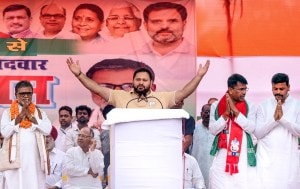From the Urdu Press: ‘Can Rekha Gupta turn Delhi into a world-class city?’, ‘Linking Urdu to religion unfortunate’
“There is disquiet among Shinde Sena leaders that they are being cut down to size, even though BJP has denied it. There are however several instances which indicate that BJP may have started a new play,” Siasat writes
 Delhi Chief Minister Rekha Gupta. (Express Photo by Amit Mehra)
Delhi Chief Minister Rekha Gupta. (Express Photo by Amit Mehra)Just after being named the Delhi Chief Minister, first-time BJP MLA Rekha Gupta pledged to take the national capital to “new heights”. She faces a daunting task in fulfilling the objective to turn Delhi into a world-class city with clean water and air while ensuring sustainable spaces for the underprivileged. Her government would also encounter an aggressive Aam Aadmi Party (AAP) which has chosen ex-CM Atishi as the Leader of the Opposition (LoP). The Urdu dailies hailed the rise of the two Delhi women leaders across the aisles, calling it a milestone in the continuing struggle for ensuring gender equality in Indian politics.
URDU TIMES
Highlighting that Rekha Gupta has become the fourth woman CM of Delhi after Sushma Swaraj (BJP), Sheila Dikshit (Congress) and Atishi (AAP), the Mumbai-based Urdu Times, in its February 21 editorial, says the task is cut out for Gupta after her party BJP’s return to power in the capital after 27 years. It says Gupta’s selection as the CM indicated the BJP’s outreach to women, who played a crucial role in helping the party to end the Arvind Kejriwal-led AAP’s 10-year rule. “Women are underrepresented in politics and decision-making in Delhi too, even though the city’s female residents have always been at the forefront of its various political and social campaigns. Ensuring leadership roles for women leaders is an imperative for good governance,” it notes.
The daily says that during her 15-year tenure as the CM, late Congress stalwart Sheila Dikshit tried to modernise Delhi’s infrastructure and amenities, but eventually lost public support after her government came under the cloud of various alleged scams. “The AAP combined the middle class’s antipathy against the Congress government over corruption with the demands of the downtrodden to build a movement that powered its repeated sweep of the Delhi polls. The AAP’s governance model based on welfare schemes, especially in the education, health and energy sectors, became popular but the party lost the mandate after losing its high moral ground on the corruption issue,” it says.
The editorial points out that Gupta checks all the boxes for the BJP high command. “Gupta belongs to the Baniya community, which is part of the BJP’s core vote bank. Her political journey started from the ABVP, the RSS’ student wing. She has also been a councillor who dealt with local administration,” it says. “Gupta is also not a dynast, who rose from the BJP ranks. This is why she was chosen over another CM-aspirant Parvesh Verma, the son of former Delhi CM Sahib Singh Verma.”
All eyes will now be on how the Gupta-led government shapes Delhi’s future, the edit says. “Delhi has always remained the centre of the country’s political power, institutions and resources, charged with energy and enterprise, and marked with history. The key question now is, what kind of Delhi will be developed by the BJP government?”
SIASAT
Referring to the widening rift within the BJP-led Mahayuti barely three months after it clinched the Maharashtra polls by a landslide, the Hyderabad-based Siasat, in its February 19 leader, says the differences between the ruling alliance’s key constituents BJP and Eknath Shinde-led Shiv Sena seem to be growing. “There is disquiet among the Shinde Sena leaders that they are being cut down to size, even though the BJP has denied it. There are however several instances which indicate that the BJP may have started a new play,” the daily says. It says that the security cover of about 20 Sena leaders has been downgraded by the Devendra Fadnavis government. While it has been done for other parties’ leaders as well, the Shinde camp was said to have taken its brunt.
“Some Sena ministers also have concerns that key policy decisions are being taken by the officers in their departments without taking them in confidence,” the daily says. Deputy CM Shinde was initially left out of the State Disaster Management Authority, which included CM Fadnavis and another Deputy CM Ajit Pawar, the NCP chief, the edit notes, adding that it was only later that rules were changed to accommodate Shinde in this panel. The BJP seems to be giving preference to Ajit over Shinde, it says. “Shinde is also trying to put pressure on the BJP, setting up Deputy CM Medical Relief Aid Cell despite the existence of the CM Relief Fund.”
The editorial notes that the BJP-Sena tussle began in the wake of the Assembly results, after the BJP denied Shinde a second shot at the CM post. “The BJP also started tightening its grip on the administration. It used Ajit as a leverage against Shinde, given that the BJP’s own tally is close to the majority mark,” it states.
“But this has also renewed a perception that after forming a coalition government the BJP tends to ‘undermine’ its allies by stepping into their spaces or playing them against each other. In Bihar, it was said to have pitted LJP leader Chirag Paswan against Nitish Kumar earlier,” the edit claims.
In a bid to form the Mahayuti government 1.0, the BJP had let Shinde helm the government with Fadnavis as his deputy, it says. “After its poll triumph, however, the BJP seems to be returning to its playbook.”
URDU TIMES
Flagging the heated exchange that the Uttar Pradesh Assembly saw on the opening day of the Budget session between the ruling BJP and the Samajwadi Party (SP) members over the omission of Urdu and inclusion of English among the languages for translation of the House proceedings,Urdu Times, in its February 20 editorial, writes that the slurs used in the House to oppose the Urdu translation was not only “unparliamentary” but also marked a new low in the parliamentary discourse. “The move to make available the translation in four regional languages — Awadhi, Bhojpuri, Braj and Bundeli — as well as English should be welcomed but Urdu’s claim also should not have been ignored.”
The daily points to the fireworks traded between CM Yogi Adityanath and SP veteran and LoP Mata Prasad Pandey, a former Speaker, in the House over the row. Pandey sought the inclusion of Urdu translation while opposing the use of English. Slamming the SP, Adityanath charged that its leaders send their own children to the English-medium schools but want others’ children to learn Urdu and become “maulvis” (Islamic clerics).
“This is unfortunate that power politics has even communalised an Indian language like Urdu,” the editorial says. There have been a galaxy of non-Muslim Urdu writers, including Premchand, Krishan Chander, Pandit Brij Narayan Chakbast, Pandit Ram Prasad Bismil, Tilok Chand Mehroom, Kalidas Gupta Riza, Rajinder Singh Bedi, Raghupati Sahay (Firaq Gorakhpuri), Gopi Chand Narang and Gulzar, among others, it notes. “Urdu was born in India. It grew up to become the language of a large section. A legion of non-Muslim writers played a crucial role in the development of the Urdu language and literature,” it states. Underlining the contribution of Urdu in India’s freedom struggle, it says, “The enduring slogans like ‘Inquilab Zindabad’ and ‘Sarfaroshi ki Tamanna’ are in Urdu.” The edit notes that while castigating the BJP over the row SP chief Akhilesh Yadav and AAP leader Sanjay Singh pointed out that Adityanath himself uses Urdu words in his speeches.







- 01
- 02
- 03
- 04
- 05
























